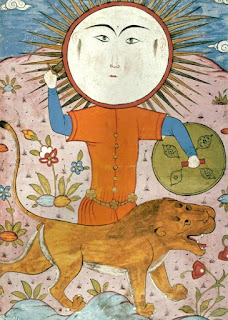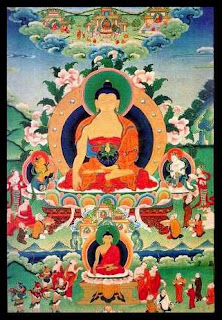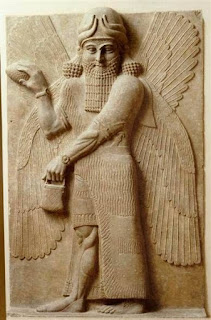The Human Heart and Its Inconceivable Functions
According to ancient Egyptian wisdom and the teaching of the Sufis, the heart is far more than the organ that sustains a human body. It is a limb bound to the cosmos and to primordial matter. Ancient Egyptian texts tell us that the coming-into-being of the heavenly paradise—the realm of spirits—began in the heart of Pharaoh Amon. Pharaoh Amon declares: “I was alone. I created a pillar within my heart and brought forth many beings… By unfolding the unfolding I unfolded, that is, I emerged from the primordial matter I myself had made… Before this there was nothing. I manifested from the primordial matter and created all things.” These words testify that the act of creation is intimately tied to the heart. The Pir—Pharaoh Amon—by the soul living in his heart and the imagination dwelling in his mind, fashioned paradise through countless offerings. By means of theurgy and sacred arts, by “mingling” the souls of those offered with primordial matter, he shaped from that union the cosmic heavenly god Atum and, within that divine presence, Geb—the hidden realm (al-Ghayb), the heaven. Thus the paradise that began in the heart of Pharaoh Amon and was unveiled in the sky is named in Egyptian sources the “City of Hearts.” In one funerary text the departed pleas to the Divine: “Make my heart in the House of Hearts and my mind in the House of Minds. Let my heart repose upon its throne…”.
Ancient Egyptian philosophy teaches that, at death, the soul departs from the heart and travels to the “City of Hearts” in the heavens—the city the Pharaoh Amon had first imagined and established within his own heart by the help of the souls offered in sacrifice.
Baháulláh, the noted mystic, likewise calls paradise the “City of the Heart” in his Seven Valleys and describes the soul’s journey thither. Al-Ghazali, another luminous teacher, wrote of the heart: “The second meaning of the word ‘heart’ is the Divine spiritual gift (latīfa rabbāniyya rūḥāniyya) associated with the organ. This gift is the essence of man: it perceives, knows, and understands. It also speaks, observes, reproves, and demands.” Scholar Naumkin, examining Ghazali’s legacy, notes that enclosed within the heart is a faculty called the Divine Light: “It may be called ‘intellect,’ the ‘inner eye’ (baṣīra bāṭiniyya), the ‘light of faith,’ or ‘true knowledge”. For the Sufis the heart is the dwelling-place of God’s presence—the very locus where the Divine essence becomes incarnate within the material. In Sufi doctrine, inspiration is a light God sends into the hearts of the faithful; only by that light can one perceive the Qur’an’s inward meanings. Ordinary human hearts are incapable of grasping Divine secrets. The Qur’an says: “They have hearts, yet they do not understand.” (Al-A‘rāf, 179.) The venerable Sufi al-Ash‘ari explains the sealed condition of the unbeliever’s heart as Divine protection from a calling they cannot receive: “Their heart is covered, their chest is constricted, and it is forbidden for them to accept the truth.” Parallel reflections are found in Christian mystical writings. Thus the heart is not merely a circulatory pump: it is the center of Divine knowing and will.
In the unfolding of human history only one—Pharaoh Amon—penetrated the mysteries of primordial matter and, through heart and thought, engendered in the heavens the god Atum and, in his image and likeness, the first Divine beings, granting them immortality. I explore this at length in my book "The History of the God Azer". Those immortal beings are called in the ancient sources the Heavenly Humans. Formed in the image and likeness of Atum, they are the archetype of regents and prophets. Sufi tradition names Atum the Perfect Man; the Heavenly Humans are the lineage of kings and prophets. Their hearts are nourished by Divine Light and inspiration—their hearts open to God’s will and thought; they apprehend truth, wisdom, and consummation. Among rulers this condition was termed salāt—from which the title sultan is derived. In other words, sultans are a sanctified lineage united with God. God reveals His will through the messages He sends into the hearts of these beings. According to the sources, God Himself created these Heavenly Humans and entrusted them with the task of forming mortal earthly peoples. I have treated this topic in detail in my article “Humans Were Created by the Khazar Beys — the Elohim” on my web page. The hearts of earthly humans govern only bodily needs. They do not receive the Light; they sustain merely physical life. Such people live as prisoners of the material realm—their hearts closed. Sufis call them slaves of the animal nafs. In this symbolic key, Babak’s cry “Do not live like a slave” and Moses’ liberation of the Israelites from bondage bear profound spiritual meaning.
All this means: the heart is not only an organ; it is the center of creation, cognition, and spirit, fulfilling additional Divine functions within the life of the Heavenly Humans.
Modern scientific inquiry has revealed that the human heart contains roughly 40,000 neuron-like cells. These cells form an intracardiac nervous system and function as the heart’s own small “brain.” Through these cells the human soul receives Divine guidance and the light of fitrah. The brain acts as a receiver of signals originating in the heart; the heart, in turn, is bound to the Divine Light. That Light opens pathways to depths of spiritual and intellectual perception into which external science and cold reason cannot penetrate.
Via its intracardiac neurons this Light exerts an independent influence upon the brain, heightening intuition and aiding the comprehension of Divine knowledge. From the vantage of science, the neuron-like heart cells regulate brain activity and shape emotion and intuition. Since the heart of the Heavenly Human is attuned to the Divine Light, it influences the brain through these intracardiac neurons and moves in accord with God’s will. The heart of the earthly human remains closed and confines itself to corporeal functions. A study of expressions in the Azerbaijani language concerning the heart shows that our sacred ancestors linked every human endeavor directly to the heart. The living record of their speech furnishes proof: “to warm the heart,” “to give heart,” “a heart-friend,” “to act from the heart,” “to break a heart,” “to burn the heart (the soul),” “to pull a thorn from the heart,” “to pour out the heart,” “heart in the throat,” “heart fell to the feet,” “heart leapt,” “heart opened,” “heart melted,” “heart shrank to a lump,” “heart turned to ice,” “heart became blood,” “heart caught fire,” “heart became like a mountain,” “heart of stone,” “heart desires,” “heart wounded,” “heart trembles,” “heart softened,” “heart quieted,” “heart rejoices,” “heart kindled into flame,” “heart torn apart,” “heart grieves,” “to pour boiling water into the heart,” “to press a mountain upon the heart,” “to drop into the heart,” “to find a way to the heart,” and many others.
All this demonstrates that the heart of the lineage of the Perfect Man possesses not only a pump’s function but also its own reason—an intellect united with God. Through the unity of heart and mind, ancient kings, prophets, and their descendants—the line of the Perfect Man—worked marvels.
More detailed evidence, incontrovertible facts, and sources are gathered in my book Batini-Qur’an and in my other writings and hundreds of scholarly articles.
Firudin Gilar Beg
Sufi-Batini Scholar
12 September 2025



Комментарии
Отправить комментарий